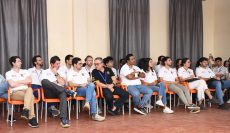On the morning of Saturday 9th March 2024, all roads led to Limuru Cheshire for the participating COP team of that weekend, and I happened to be among that very excited lot. Despite the heavy downpour in the wee hours of the morning, the morning started as usual, very hot but bright and vibrant. At exactly 9:14 am, we exited the Strathmore gate to Limuru Cheshire. This being my second time there, I was very excited to go back. I sat by the window in the bus and enjoyed the beautiful green scenery of Limuru. Although I have been to Limuru several times, I can’t seem to get over that place. It’s so beautiful and very green.
Limuru Cheshire is one of the homes under the Cheshire Disability Services in Kenya. It is home to 56 very loving and amazing girls living with various mental and intellectual impairments. The girls are kept in the home for a period of four years where they are taught basic survival skills such as care for personal self, speech therapy for some of them, hands-on skills such as dress making, bead work, poultry keeping, agriculture, computer literacy and so much more. These skills are intended to help them integrate with the world once their four years expire.
We were welcomed by one of the three Sisters who run the home. She briefed us about the home and the girls after which the tasks were divided among the 40 very excited cop veterans. The tasks included chopping firewood, cooking, laundry and hair braiding for the girls. The last time I was there, I was in the kitchen and I finally learnt to cook the famous pilau. This time I decided to challenge myself and try something new—gardening. At the shamba, I got a chance to work with Teacher Mike, one of the teachers who teaches the girls pre-literacy and speech. He gave me a brief history about the school and the kind of cases they handle, what is expected of them, and so on. Teacher Mike, a few of the girls and I planted Sukuma Wiki, Spinach, beans and tomatoes. It was such a thrilling experience! I happened to be the one digging the holes and I got to learn how the soil is usually mixed with manure and then the seedlings planted. I got to learn a new perspective of farming. I had thought tomato seeds were scattered in the soil and left to germinate on their own, but apparently you can grow them in a nursery and then transfer the seedlings to a garden. I also learnt how sowing is done for beans.
Teacher Mike explained to me that the girls are usually trained based on their backgrounds. For instance, if a girl comes from a farming background, she receives instruction tailored to that context. Even then, they try to ensure that the girls are well rounded. The girls are usually given a small square of land where they are encouraged to plant any crop, mostly vegetables of their choice and they are to tender to them until they mature. These include: weeding, watering and application of manure when necessary. Once the girls have learnt the basic farming skills and how to care for the crops, the crops are then transferred to the main garden.
After the planting, I had a small tour of the home where I learnt that the home has an expansive tract of land that they have properly utilised for agriculture. They have a tea plantation, green houses that contain green paper, tomatoes and kales and other vegetables, and cattle. They also have poultry birds, which are a major source of income to the home. The farm is an NGO and they mainly rely on donors and well-wishers for their day-to-day living expenses. After a tour of the place, I did a few rounds of fetching firewood from where they were being cut to the back of the kitchen where they are usually kept.
After all this, I still had a few minutes to interact with the girls. With my limited Swahili vocabulary, I got to hear their very interesting stories about the projects they have worked on and what they have learnt so far. Genevieve, one of the girls, even promised me a bangle with my name the next time I visit. She was very excited to tell me about her bead work skills and took me through a small tour to show me some of the bead work she and her friends had done. She even showed me the dresses and bags they had made. I was impressed.
‘Disability is not inability’; I can’t agree more. Because these girls are so talented and there is so much more to them than what the world may view them as. At about 5:20 pm, we departed for Strathmore University and arrived at about 7 pm. I headed home a very exhausted but fulfilled individual.
Article written by Giramia Monica.
What’s your story? We’d like to hear it. Contact us via communications@strathmore.edu





